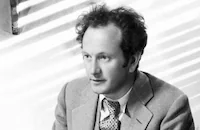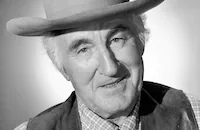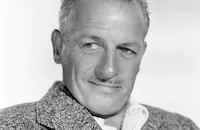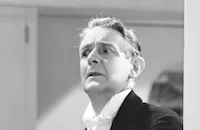The Little Minister

Brief Synopsis
Cast & Crew
Richard Wallace
Katharine Hepburn
John Beal
Alan Hale
Donald Crisp
Lumsden Hare
Film Details
Technical Specs

Synopsis
In 1840, the village of Thrums, Scotland, whose main industry is weaving, anticipates the arrival of its new minister, Gavin Dishart, with enthusiasm. Although small in stature, Gavin quickly impresses the townspeople with his inspired sermonizing and prudent, firm ways. The villagers are especially impressed when Gavin convinces Rob Dow, Thrums's most notorious drunkard, to give up alcohol. Gavin's quiet world is threatened, however, by the unhappy relations between the Thrums weavers and the area manufacturers, who by forcing prices down, have driven many villagers to poverty and violent protest. Gavin also is unnerved when he meets Babbie, a high-spirited young woman dressed like a gypsy, in the woods. Actually the well-educated fiancée of Lord Milford Rintoul, whose estate overlooks the village, Babbie flirts boldly with Gavin and plays the part of the wild gypsy to the hilt. While she bewitches the inexperienced Gavin, Rintoul, who is in cahoots with the manufacturers, arranges for a group of soldiers to raid Thrums and round up the militant labor leaders. Aware of Rintoul's plan, Babbie tricks Gavin into sounding an alarm that alerts the villagers to the arrival of the soldiers. Although he at first decries the ensuing rock and mud throwing, Gavin finds himself tossing divots at the soldiers alongside the feisty Babbie. After the melee, Gavin goes to Rintoul and entreats him to be lenient with the weavers. Rintoul, however, is concerned only with capturing the "gypsy," oblivious to the fact that she is his fiancée. Babbie further confuses Gavin when she intercedes on behalf of Nanny Webster, an old woman threatened with the poorhouse. By pledging to give money to Nanny, Babbie is able to meet with Gavin alone and finally forces him to confess his attraction for her. Gavin's increasingly distracted behavior creates anxiety in the villagers, who fear that he has fallen in love with the wrong sort of woman. Rob Dow even returns to drinking when he sees Babbie and Gavin together, convinced that his moral mentor has himself been led astray. Then when Rob Dow's son Micah reveals to Babbie that his father is drinking and beating him because of her and that Gavin's career will be ruined by their romance, Babbie decides to end the relationship and marry Rintoul within the fortnight. On the eve of her wedding, a heartbroken Babbie goes to Nanny's to say goodbye and there is reunited with an equally miserable Gavin. After revealing to Gavin her true identity, Babbie describes how Rintoul found her as a little girl, abandoned by her gypsy tribe, and reared her as his ward. Gavin convinces her that once Rintoul, whom Babbie has agreed to marry only out of gratitude, learns of their love, he will release her from her promise. Before Gavin and Babbie can notify Rintoul of their decision, however, the church elders vote to dismiss Gavin and go to his house to confront him. There they find Babbie alone with Gavin's kindly old mother and are unable to break the news. Gavin, meanwhile, is accidentally stabbed by Rob Dow at the church and is carried home, near death. Before collapsing, Gavin defends Babbie to the elders, who finally realize that their little minister is in love with a fine woman. The next morning, Rintoul releases Babbie to marry the recovering Gavin, and she rushes to his bedside.

Director

Richard Wallace
Cast

Katharine Hepburn

John Beal

Alan Hale

Donald Crisp
Lumsden Hare
Andy Clyde
Beryl Mercer
Billy Watson
Dorothy Stickney
Mary Gordon

Frank Conroy

Eily Malyon

Reginald Denny

Leonard Carey

Herbert Bunston
Harry Beresford
Barlowe Borland

Ivan Simpson
Herbert Evans
Olaf Hytten
Marion Clayton

E. E. Clive

Brandon Hurst
Charles Coleman
Joe North
William Jeffrey
Dan Maxwell
Elsa Buchanan
Crew
Victor Appel
S. H. Barton
Pandro S. Berman
Carroll Clark
Cleo Crabtree
J. R. Crone
Charles Darwin
Robert De Grasse
George Diskant
Pat Doyle
Carl Dreher
Hobe Erwin
Hobe Erwin
Henry Gerrard
Mary Gordon
William Hamilton
Victor Heerman
Alex Kahle
Sam Kaufman
Millie Kent
Edward Killy
Thomas Little
Sarah Y. Mason
Jane Murfin
Mortimer Offner
Emily Perkins
Walter Plunkett
Van Nest Polglase
Clem Portman
Sam Redding
Sandy Sandeen
Charles Sayers
Murray Spivack
Harold Stein
Max Steiner
Tommy Thompson
Jack Wagner
Vernon Walker
Robert Watson
C. J. White
Jean Woodhall

Photo Collections
Videos
Movie Clip


Film Details
Technical Specs

Articles
The Little Minister
Following four well-received films, including her Oscar®-winning Morning Glory (1933) and the box-office smash Little Women (1933), Hepburn had scored her first big failure playing an Ozarks faith healer in Spitfire (1934). After a critically panned Broadway flop in The Lake (the play that prompted Dorothy Parker to quip, "Let's all go down to the Alvin Theatre to see Katharine Hepburn run the gamut of emotions from A to B") and an aborted attempt to star in a summer theatre tryout of Dark Victory (Tallulah Bankhead would take the play to Broadway, where it died quicker than its terminally ill heroine), Hepburn was desperate for a success. She was considering a return to Broadway in a stage adaptation of Pride and Prejudice, but RKO head Pandro S. Berman was more interested in shoring up her faltering box office. Among the projects under consideration were a film version of George Bernard Shaw's St. Joan (for which Hepburn shot test footage in color), a biography of novelist George Sand and a screen adaptation of John Galsworthy's six-volume The Forsyte Saga. When none of these panned out RKO bought the rights to James M. Barrie's novel and play The Little Minister.
Barrie had adapted his 1891 novel to the stage in 1897, and it had scored on both sides of the Atlantic. In the U.S., it became a hit in the hands of Maude Adams, a stage actress famous for starring in such Barrie plays as What Every Woman Knows and Peter Pan. She revived the play twice more over the years, then Ruth Chatterton returned to Broadway for a 1934 revival. The story had already been filmed five times since 1913, which may have prompted Hepburn to reject it at first (May Beatty, who starred in a 1915 version, played the maid in Hepburn's remake). RKO then offered the film to Margaret Sullavan. When Hepburn heard that Sullavan, whom she considered a rival, was eager to play the role, she changed her mind despite warnings from her agent Leland Hayward whom she was dating at the time (he would marry Margaret Sullavan in 1936).
Among the writers RKO assigned to The Little Minister were Sarah Y. Mason and Victor Heerman, the team who had helped turn Little Women into a movie classic. Whether it was their fault or that of the other three writers credited with the script, they decided to improve on Barrie by pitching the film more toward drama than his trademarked whimsical comedy. Then for comic relief they created scenes for comedian Andy Clyde. Both moves were soundly criticized in reviews.
In their efforts to make lightning strike twice, the studio's executives approved a high for the day budget of $650,000 for the film. As a result, the company did location shooting in California's Sherwood Forest and Laurel Canyon and the crowd scenes were shot on a grand scale. Things got a little out of control during the filming of the townspeople's attempt to drive out a minister (John Beal) who has fallen in love with Hepburn's gypsy. One of the extras accidentally stabbed Beal in the eye, almost causing him to lose his vision permanently.
The lavishness paid off in one way; the Scottish village built for the film on the RKO back lot was used in several other films, most notably the Laurel and Hardy comedy Bonnie Scotland (1935). But the film was so expensive that it failed to make back its cost, losing $9,000. Anxious to recover Hepburn's box-office status, the studio pushed her into one failure after another.
Hepburn's reviews were surprisingly good, even from reviewers who lamented the changes to Barrie's original. But the New York Sun's Eileen Creelman sounded a dissenting note that would come to haunt Hepburn in later films, calling her more of a personality than an actress: "Miss Hepburn, gauntly handsome and spirited, makes no attempt to become that elusive, charming creature, a Barrie heroine. She is just Miss Hepburn, arch, vivid, varying little, adored by a vast public. Wistfulness is not a Hepburn characteristic" (in Homer Dickens, The Films of Katharine Hepburn). Yet The Little Minister also contributed to the Hepburn legend. Her role as a champion of the working poor gave audiences their first glimpse of Hepburn the feisty liberal, a role she would play throughout her career. At the time, the studio tried to keep her support of progressive politicians out of the press such as her strong endorsement of Upton Sinclair, whose run for California governor threw Hollywood's more conservative businessmen into a panic. In later years she would make no bones about her support for liberal politicians and causes. Where other stars suffered at the box office for being too politically outspoken, however, Hepburn's politics just reinforced her image as a rebel, out to conquer Hollywood and the world on her own terms.
Producer: Pandro S. Berman
Director: Richard Wallace
Screenplay: Jane Murfin, Sarah Y. Mason, Victor Heerman, Mortimer Offner, Jack Wagner
Based on the novel and play by James M. Barrie
Cinematography: Henry Gerrard
Art Direction: Van Nest Polglase, Carroll Clark
Music: Max Steiner
Cast: Katharine Hepburn (Babbie), John Beal (Gavin), Alan Hale (Rob Dow), Donald Crisp (Dr. McQueen), Lumsden Hare (Thammas), Andy Clyde (Wearyworld), Beryl Mercer (Margaret), Dorothy Stickney (Jean), Frank Conroy (Lord Rintoul), Reginald Denny (Capt. Halliwell).
BW-110m. Closed captioning.
by Frank Miller

The Little Minister
Quotes
Trivia
Notes
Barrie's play was based on his novel of the same name, which was published in 1891. The copyright records state that the film was based on the novel, not on Barrie's play, but all other sources refer to the play as the film's source. According to a July 1934 Hollywood Reporter news item, Paramount sold the rights to Barrie's play to RKO in exchange for the services of RKO's contract star Francis Lederer. The New York Times review claims that Dorothy Emerson "fictionized" the story, but no other contemporary source mentions this credit. Although production files for the film state that RKO purchased the rights to the song "Twas Meant to Be" from Val Burton and Will Jason, and a Film Daily pre-production news item announced that H. W. Hanemann wrote a song for Katharine Hepburn called "The Willful Male," the only song performed in the picture was "House of Argyle," which was sung in part by Hepburn. A November 1934 Film Daily news item states that Jessie Ralph was to replace Charlotte Granville in the cast. Neither of these actors, however, appears in the final film. Hollywood Reporter production charts list the following additional cast members: Charles Irwin, Charles McNaughton, Jane Baxter, Elsie Prescott and Anna Q. Nilsson. Their participation in the final film has not been confirmed. Some scenes in the film were shot in Sherwood Forest in the San Fernando Valley and at the Fryman Ranch in Laurel Canyon. During the filming of a mob scene, actor John Beal was stabbed in the right eye by an unidentified extra and nearly lost his sight, according to a Daily Variety news item. The Little Minister was cinematographer Henry Gerrard's last film. According to contemporary sources, Gerrard died of a mistreated appendicitis during the final stages of filming.
Modern sources add the following information about the production: Although Hepburn was not at first interested in playing "Babbie" and was advised against taking the part by her agent and others, she changed her mind when she heard that Margaret Sullavan desperately wanted the role. During production, Hepburn made suggestions for the story's ending, some of which director Wallace incorporated into the film. Editing and scoring for the picture required nearly a month's time. The film's budget was a high $650,000, and the picture lost RKO almost $10,000 at the box office. Modern sources credit Mel Berns with the film's makeup, and add May Beatty (Maid) to the cast.
In 1915, Oscar Apfel directed Dorothy Bernard in a Fox Film Corp. production of Barrie's story called The Little Gypsy (see AFI Catalog of Feature Films, 1911-20; F1.2526). In the early 1920s, two other versions were produced: Penryhn Stanlaws directed Betty Compson in a 1921 Famous Players-Lasky release; and David Smith directed Alice Calhoun in a 1922 Vitagraph production (see AFI Catalog of Feature Films, 1921-30; F2.3122 and F2.3123). In addition, Maude Adams, who portrayed "Babbie" in the original stage production, revived the part on the radio in two 1934 NBC network broadcasts of the play.

Miscellaneous Notes
Released in United States 1934
Released in United States 1934













